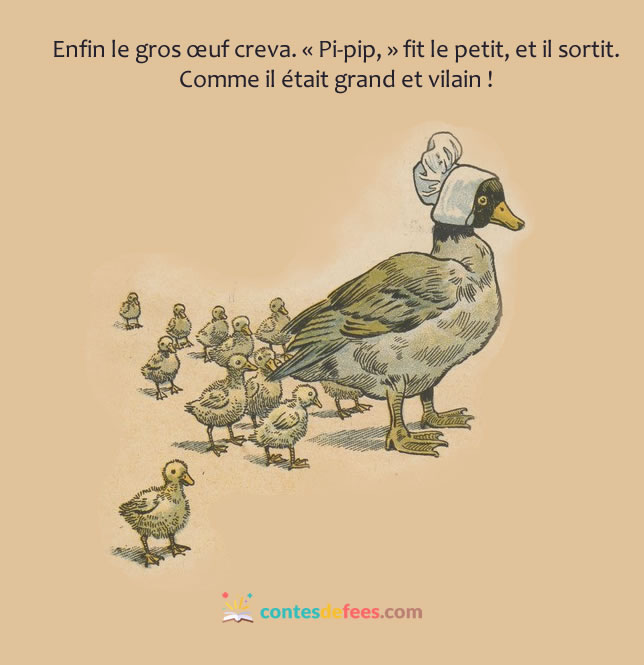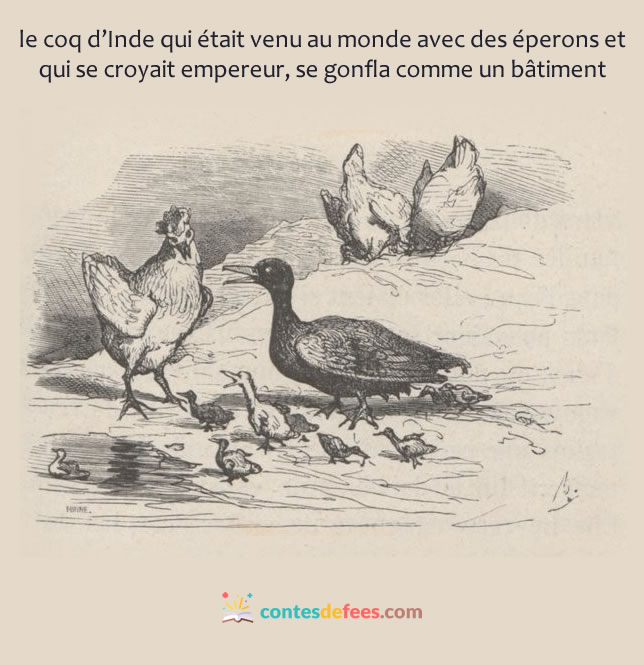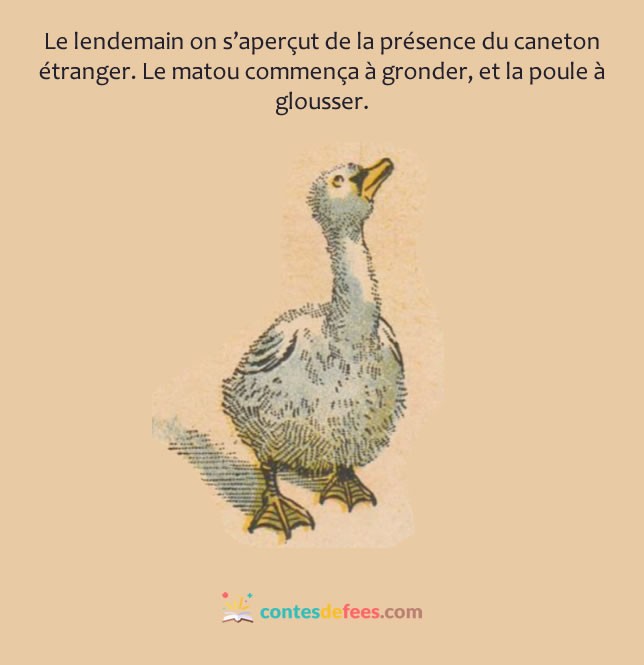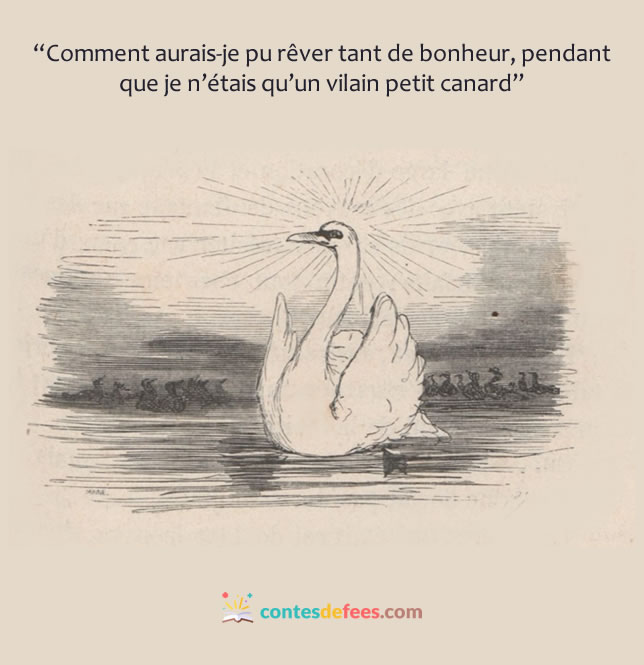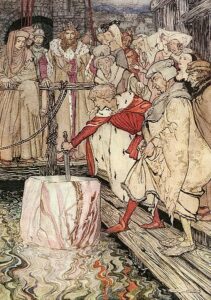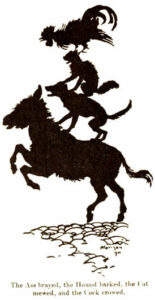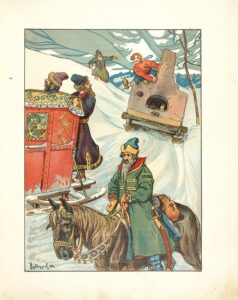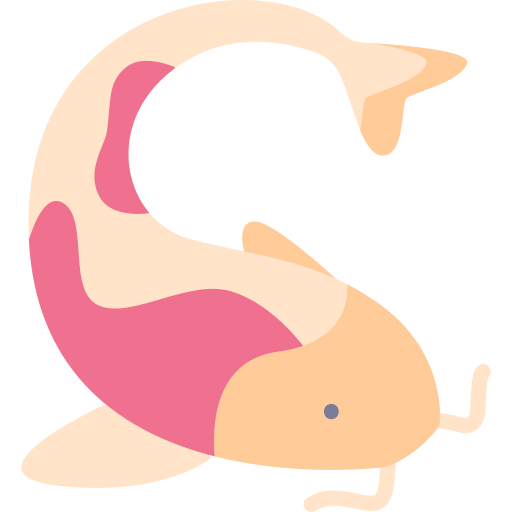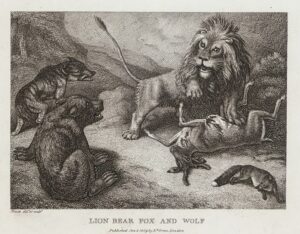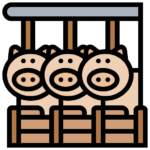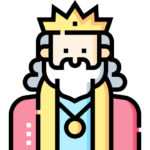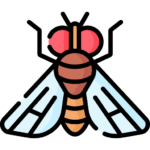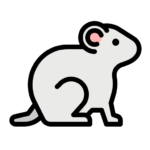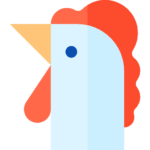
The ugly duckling
LIRE
Tale by Hans Christian Andersen. Troriginal edition of 1862. Illustrations by Bertall, Job.
How beautiful the countryside was! It was midsummer; the wheat waved ears of a magnificent yellow, the oats were green, and in the meadows the hay rose in fragrant heaps; the stork walked about on her long red legs, chattering Egyptian, a language she had learned from her mother’s maiden. Around the fields and meadows stretched great forests cut by deep lakes.
Yes, indeed, the countryside was beautiful. The sun’s rays lit up a old estate surrounded by wide ditches, and great burdock leaves came down from the wall into the water; they were so high that little children could hide under them, and in the midst of them one could find a solitude as wild as in the center of the forest. In one of these retreats a duck had established her nest and was incubating her eggs; she was longing to see her young hatch. She received few visitors; for the others preferred to swim in the ditches than to come under the burdocks to splash about with her.
Finally the eggs began to burst one after the other; one heard “pi-pip;” it was the small ducks which lived and stretched their necks outside.
“Rap-rap,” they then said, making all the noise they could.
They looked around under the green leaves, and the mother let them; for green makes the eyes happy.
How big is the world?” said the little newborns at the very spot where they had come out of their egg.
– Do you think the world ends there? said the mother. Oh, no, it extends much farther, on the other side of the garden, as far as the priest’s fields; but I have never been there. Are you all there?” she continued, rising. No, the biggest egg did not move: God! how long it lasts! I have had enough.”
And she began to brood, but with an annoyed look.
How is it going?” said an old duck who had come to visit her.
– There is only this one that I have all the difficulties of the world to make burst. Look at the others: don’t you think they are the nicest little ducks we have ever seen? They all look astonishingly like their father; but the rascal does not even come to see me.
– Show me this egg that doesn’t want to burst,” said the old woman. Ah, you can believe me, it is a turkey egg. I too was deceived once like you, and I had all the trouble I could with the little one; for all these beings are terribly afraid of water. I couldn’t get him in. I had to grab him and splash around in front of him, but nothing helped. Let me look at it again: yes, it is certainly a turkey egg. Leave it there, and teach the other children to swim instead.
– No, since I have already wasted so much time, I can well stay hatching for another day or two, replied the duck.
– As you wish,” replied the old woman; she went away.
At last the big egg burst. “Pi-pip,” said the little one, and he went out. How big and ugly he was! The duck looked at him and said, “What a huge duckling. It doesn’t look like any of us. Could it really be a turkey? It will be easy to see: he must go to the water, when I should drag him there.”
The next day was a beautiful day: the sun shone on all the green burdocks; the mother ducks went with her whole family to the ditch. “Platsh!” and she jumped into the water. “Rap-rap,” she then said, and each of the little ones plunged in one after another; and the water closed over their heads. But soon they came up again and swam swiftly. The legs went all by themselves, and all rejoiced in the water, even the ugly big gray duckling.
He’s not a turkey,” she said. How skillfully he uses his legs, and how straight he stands! He’s my child too: he’s not so ugly, when you look at him closely. Rap-rap!
Now come with me: I will make your entrance into the world and introduce you to the duck court. Only don’t go away from me, so that you won’t be stepped on, and be careful of the cat.”
They all entered the ducks’ yard.
What a noise they made there! Two families were fighting over an eel’s head, and in the end it was the cat that won.
“You see how things are in the world,” said the duck, sharpening her beak; for she, too, would have liked to have the eel’s head. “Now wiggle your legs,” she continued; “hold together and say hello to the old duck over there. He is the most distinguished of all here. He’s Spanish, that’s why he’s so big, and notice that red ribbon around his leg: it’s a beautiful thing, and the greatest distinction you can give a duck. It means that we don’t want to lose him, and that he must be noticed by animals as well as by men. Come on, behave yourself; no, don’t put your feet in: a well-bred duckling spreads its feet carefully; look how I’m putting them out. Bow down and say, “Rap!”
They obeyed, and the other ducks around them looked at them and said aloud, “See a little; here are some more, as if we were not enough already. Fie, fie! What is this duck? We don’t want it.
And immediately a large duck flew from his side, threw itself on him and bit him on the neck.
“Let him be, then,” said the mother, “he is not hurting anyone.
– All right; but he is so big and funny, said the mugger, that he needs to be beaten.
– You have some nice children there, mother, said the old duck with the red ribbon. They’re all nice, except that one; he didn’t come along too well: I wish you could do it again.
– It is impossible, said the mother duck. He is not beautiful, it is true; but he has such a good character! and he swims in perfection: yes, I would even dare to say better than all the others. I think he will grow up nicely and that in time he will be formed. He has been in the egg too long, and that is why he is not very well made.”
As she spoke thus, she gently pulled him by the neck, and smoothed his plumage. “Besides, he is a duck, and beauty does not matter so much to him. I think he’ll grow up strong and make his way in the world. Anyway, the others are nice; now, my children, pretend you are at home, and if you find an eel head, bring it to me.”
And they did as if they were at home.
But the poor duckling that had come out of the last egg was, for its ugliness, bitten, pushed and scorned, not only by the ducks, but also by the chickens.
“He is too big,” they all said, and the guinea cock, who had come into the world with spurs and thought he was an emperor, puffed up like a ship with all sails out, and marched straight at him in great fury and red to the eyes. The poor duck did not know if he should stop or walk: he was very sad to be so ugly and to be mocked by all the ducks of the court.
This is what happened from day one, and things went from bad to worse. The poor duckling was driven away everywhere: his very sisters were mean to him and kept saying, “How well it would be done if the cat carried you away, you naughty creature!” And the mother said, “I wish you were far away. The ducks would bite him, the chickens would beat him, and the maid who fed the animals would kick him away.
Then he ran away and flew over the hedge. The little birds in the bushes flew away in fright. “And all this because I am naughty,” thought the duckling. He closed his eyes and continued on his way. He came to the big swamp where the wild ducks lived. He lay down there during the night, very sad and tired.
The next day, when the wild ducks got up, they saw their new friend.
“What is this?” they said: the duckling turned on all sides and saluted with all possible grace.
“You may flatter yourself that you are enormously ugly!” said the wild ducks; “but we don’t care, so long as you don’t marry any of our family.”
The wretch! Was he thinking of marrying, he who only asked permission to sleep in the reeds and drink swamp water?
He spent two days like that. Then two wild ganders arrived in this place. They had not lived much yet, so they were very unhappy.
Listen, fellow,” said these newcomers, “you are so naughty that we would be glad to have you with us. Do you want to come with us and become a bird of passage? Here nearby, in the other swamp, there are charming wild geese, almost all of them damsels, and they can sing well. Who knows if you might not find happiness there, despite your awful ugliness!”
All of a sudden we heard “pif, paf!” and the two wild ganders fell dead into the reeds, and the water became red as blood.
“Pif, paf!” and troops of wild geese flew out of the reeds. And again gunshots were heard. It was a great hunt; the hunters had laid down all around the marsh; some had even posted themselves on tree branches that protruded above the rushes. A blue vapor like small clouds came out of the dark trees and spread over the water; then the dogs came to the swamp: “flath, flath;” and the rushes and reeds bent on all sides. What a fright for the poor duckling! He bent his head to hide it under his wing; but at the same time he saw before him a great terrible dog: his tongue hung out of his mouth, and his fierce eyes sparkled with cruelty. The dog turned his mouth towards the duckling, showed him his sharp teeth and, “platsh, platsh,” went further without touching him.
“Thank God!” sighed the duckling; “I am so naughty that the dog himself disdains to bite me!”
And so he remained in silence, while the lead whistled through the rushes and the rifle shots followed one another without respite.
Only towards the end of the day did the noise cease; but the poor boy still did not dare to get up. He waited a few hours, looked around, and ran out of the swamp as fast as he could. He passed over fields and meadows; a furious storm prevented him from going forward.
On the evening he came to a miserable peasant’s hut, so old and ruined that it did not know which way to fall: so it remained standing. The storm was blowing so hard around the duckling that he was forced to stop and cling to the hut: everything was going from bad to worse.
Then he noticed that a door had left its hinges and allowed him, by a small opening, to penetrate inside: it is what he made.
There lived an old woman with her tomcat and her hen; and the tomcat, whom she called her grandson, knew how to round his back and spin his spinning wheel: he could even throw sparks, as long as his back was rubbed properly. The hen had very short legs, which earned her the name of Short-Legged. She laid excellent eggs, and the good woman loved her like a daughter.
The next day the presence of the foreign duckling was noticed. The tomcat began to scold, and the hen to cluck.
“What is it?” the woman said, looking around. But her eyesight was low, so she thought it was a large duck that had wandered off. This is a good catch,” she said, “I will now have duck eggs. Let’s hope it’s not a duck! Well, we’ll see.
She waited for three weeks; but the eggs did not come.
In this house, the tomcat was the master and the hen the mistress, so they used to say, “We and the world,” because they thought they were half the world and better. The duckling took the liberty of thinking that one could have another opinion; but this angered the hen.
Can you lay eggs?” she asked.
– No, I can’t.
– Well, then you’ll be good enough to keep your mouth shut.”
And the tomcat asked him in turn: “Can you do the big back? Can you spin your wheel and make sparks fly?
– No, I can’t.
– Then you have no right to express an opinion, when reasonable people talk together.”
And the duckling lay down sadly in a corner; but suddenly a bright air and sunlight entered the room, and it made him so eager to swim in the water that he could not help telling the hen about it.
What is this?” she said. You have nothing to do, and now you’re getting fancy. Lay some eggs or make a purr, and these whims will pass you by.
– It is however very pretty to swim on water, said the little duck; what happiness to feel it close on its head and to dive until the bottom!”
– It must be a great pleasure, indeed!” replied the hen. I think you have gone mad. Ask Kitty, who is the most reasonable being I know, if he likes to swim or dive in the water. Ask even our old mistress: no one in the world is more experienced; do you think she wants to swim and feel the water closing in on her head?
– You don’t understand me.
– We don’t understand you? but who would understand you? Do you think you know more than Minet and our mistress?
– I don’t want to talk about myself.
– Don’t get your hopes up, child, but rather thank the Creator for all the good he has done you. You’ve come to a warm room, found a society to enjoy, and you start reasoning until you can’t stand it. It’s really not a pleasure to live with you. Believe me, I want to do you good; I may say unpleasant things to you, but that’s how one recognizes his true friends. Take my advice, and try to lay eggs or make a purr.
– I think it will be more advantageous for me to go around the world,” replied the duck.
– As you wish,” said the chicken.
And the duck went off to swim and dive into the water; but all the animals despised him because of his ugliness.
Autumn came, the leaves in the forest turned yellow and brown: the wind caught them and blew them away. Above, in the air, it was very cold; heavy clouds hung, loaded with hail and snow. On the hedge the crow was cawing so much it was frozen: just thinking about it, one shivered. The poor duckling was, in truth, not at his ease.
One evening, as the sun was setting gloriously, a whole crowd of large, superb birds came out of the bushes; the duckling had never seen anything like them: they were dazzlingly white, their necks were long and supple. They were swans. The sound of their voice was very particular: they spread their long bright wings to go far from this country to seek in the hot countries of the always open lakes. They went up so high, so high, that the ugly duckling was strangely affected; he turned in the water like a wheel, he raised his neck and stretched it in the air towards the travelling swans, and uttered a cry so piercing and so singular that he frightened himself. It was impossible for him to forget those beautiful and happy birds; as soon as he ceased to see them, he plunged to the bottom, and, when he came to the surface, he was as if out of him. He did not know what these birds were called, nor where they went; but nevertheless he loved them as he had never loved anyone before. He was not jealous of them; for how could he have had the idea of wishing for himself so perfect a grace? He would have been too happy, if the ducks had consented to put up with him, the poor ugly thing!
And the winter became very cold, very cold; the duckling always swam on the surface of the water to prevent it from getting completely caught; but every night the hole in which he swam shrank more and more. It froze so hard that you could hear the ice crack; the duckling had to keep shaking his legs to keep the hole from closing around him.
But finally he felt exhausted with fatigue; he did not move any more and was seized by the ice.
The next morning, a peasant came to the shore and saw what was happening; he went forward, broke the ice and took the duck home to give it to his wife. There, it came back to life.
The children wanted to play with it, but the duckling, convinced that they were going to hurt it, threw itself in the middle of the milk pot in fear, so that the milk spilled into the room. The woman clapped her hands together in anger, and he, all frightened, took refuge in the churn, and from there in the flour-hutch, and from there took his flight outside.
God! what a sight! the woman screamed, ran after him, and wanted to beat him with the tweezers; the children rushed to the manure pile to catch the duckling. They laughed and shouted: it was a great happiness for him to have found the door open and to be able to slip between branches, in the snow; he huddled there all exhausted.
It would be too sad to recount all the misery and suffering he had to endure during that harsh winter.
He was lying in the swamp between the reeds, when one day the sun began to shine and warm up. The larks were singing. It was a delightful spring.
Then suddenly the duckling could trust his wings, which were beating the air with more vigor than before, strong enough to carry him away. And soon he found himself in a large garden where the apple trees were in full bloom, where the elderberry spread its perfume and bent its long green branches to the ditches. How beautiful everything was in this place! How everything smelled of spring!
And out of the depths of the wood came three beautiful white swans.
They flapped their wings and swam on the water. The duckling knew these beautiful birds: he was seized with an unspeakable sadness.
“I want to go and find them, those royal birds; they will kill me, for daring, I, so naughty, to come near them; but I don’t care; better to be killed by them than to be bitten by the ducks, beaten by the hens, pushed with the foot by the barnyard girl, and to suffer the miseries of winter.”
He jumped into the water and swam out to meet the swans. They saw him and rushed towards him with their feathers raised. “Kill me,” said the poor animal; and, bending his head towards the surface of the water, he awaited death.
But what did he see in the transparent water? He saw his own image below him: it was no longer a poorly made bird, grey-black, ugly and disgusting, he was himself a swan!
There is no harm in being born in a barnyard when you come out of a swan’s egg.
Now he felt happy with all his sufferings and sorrows; now for the first time he tasted all his happiness in seeing the magnificence that surrounded him, and the great swans swam around him and caressed him with their beaks.
Little children came to the garden and threw bread and grain in the water, and the smallest of them cried out, “There’s a new one!” and the other children shouted for joy, “Yes, yes! that’s right; there’s another new one.” And they danced around the edges, then clapped their hands; and they ran to their father and mother, and came back again to throw bread and cake, and they all said, “The new one is the most beautiful! How young he is! How beautiful he is!”
And the old swans bowed to him.
Then he felt ashamed, and hid his head under his wing; he did not know how to hold himself, for this was too much happiness for him. But he was not proud. A good heart never becomes proud. He thought of how he had been persecuted and insulted everywhere, and now he heard them all say that he was the fairest of all these beautiful birds! And the elder tree itself inclined its branches toward him, and the sun shed such a warm and beneficent light! Then his feathers puffed up, his slender neck rose, and he cried out with all his heart, “How could I have dreamed so much happiness, while I was only an ugly little duckling.”
FIN
Vous avez repéré une erreur ? N’hésitez pas à nous la signaler en nous écrivant sur cette page
VOUS AVEZ AIMÉ CE CONTE? PARTAGEZ-LE!
AJOUTER AUX FAVORIS
Vous avez aimé ce conte? Ajoutez-le à vos favoris et donnez-lui un like en cliquant le coeur:
CATÉGORIES DU CONTE
Tout savoir sur les Contes de Fées
Avec les clés de lecture
Lisez notre page expliquant l’utilité des Contes de Fées, au niveau intellectuel, émotionnels et des valeurs morales.
Comprendre ce que représente chaque archétype de personnage, bon ou mauvais. L’importance des objets, de la magie, des animaux, etc.
Ajoutez votre version, votre audio ou vos images
Ou publiez votre propre conte
Envoyez-nous votre conte original, votre version ou complétez un conte avec vos illustrations ou un enregistrement audio.

Abonnez-vous à partir de 0,99€ (Promo)
Offre de lancement: Gratuit pour les professeurs
Écoutez les lectures audios en entier
Ajouter des bruitages et musiques de fonds
Garder vos contes favoris et gérer votre liste
Enregistrer vos histoires via l'enregistreur vocal
Accédez aux excercices de français en grammaire, compréhension, rédaction et débats
Télécharger les contes en PDF
Traduire les mots en anglais et améliorer votre français
D’AUTRES CONTES QUI POURRAIENT VOUS PLAIRE:
LE DICTACONTE (BETA)
Instructions
2) Réduisez l’enregistreur pour lire le conte en recliquant sur l’icône en bas de l’écran.
3) Éditez et sauvegardez en recliquant sur en bas.
C'est à vous de lire. Enregistrez-vous!
Vous devez être abonné(e) et connécté(e) pour pouvoir sauvegarder.
Connectez-vous – Abonnez-vous ou tester simplement
ABONNEZ-VOUS




